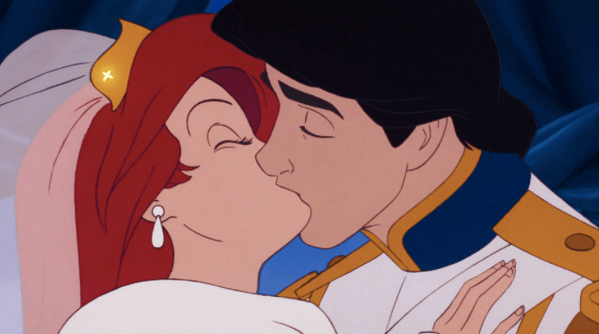Back in the 1970s, Australian educator Irina Dunn coined the phrase, “A woman needs a man like a fish needs a bicycle” by writing it on the walls of two public bathrooms. The phrase would later come to be associated with feminist activist Gloria Steinem because it summed up a major tenet of the feminist movement: women don’t need men. These days, this sentiment has been carried so far that modern feminists seem to hold the viewpoint that, not only do women not need men, they also don’t need love.
In case there’s any doubt that feminists think this, look at the way they attack fairy tales (and movies based on them) for suggesting that a “happily ever after” includes a soulmate to share it with. In an article for The New York Times, feminist journalist Peggy Orenstein wrote, “I watch my fellow mothers, women who once swore they’d never be dependent on a man, smile indulgently at daughters who warble ‘So This Is Love’ or insist on being called Snow White.” It’s as if Orenstein thinks that attraction to the love stories in these fairy tales somehow negates a woman’s ability to be independent.
In an article for mommyish.com, Sarah Bregel says that, after her two-year-old watched Disney’s The Little Mermaid, she became interested in princesses and marriage. “A 2-year-old talking about marriage and imitating marriage?” Bregel wails. “I’m just not into it. It doesn’t seem healthy and it kind of freaks me out.”

It shouldn’t be controversial to say that romantic love is part of a full and complete life. Regardless of whom you love, there ought to be no doubt that having someone to share your life with, raise children with, laugh with, and grieve with makes life more meaningful. So much so, that one might say this type of connection was — if not necessary — highly desirable. But, somehow, this notion has become anathema to modern feminists.
In fairy tales, the princess’ union with the prince usually happens at the end — when the actual action of the story has been played out. The union signifies the princess’ readiness to embark on her adult life — a life that wouldn’t be full or complete, without a partner — knowing now whatever it was she didn’t know at the beginning. Love is not — as feminists so often suggest — the princess’ only goal.
In the Brothers Grimm version of Cinderella, for instance, the “good and pious” Cinderella is juxtaposed to the step-sisters who are “beautiful and fair in appearance,” but “black and ugly” at heart. Cinderella must find a way to be seen as “beautiful and fair” on the inside, even though she looks “black and ugly,” on the outside. Once this plot line — which has nothing to do with being rescued by Prince Charming — takes place, Cinderella is primed for her “happily ever after” which includes a good man to share it with. A man who sees her for her true self, even in rags. What’s not to like?

Feminists chafe against this notion of love as a part of fulfillment so much, they’ve influenced the way major film companies — like Disney — tell their stories. Now, instead of finding a soulmate to complete their happiness, many Disney princesses actively avoid romance. In the 1995 film, Pocahontas, Pocahontas chose not to follow her lover, John Smith, back to Europe for absolutely no reason at all, rendering the entire plot of the movie meaningless and, for this, she is considered a “straight-up feminist hero” (Kayleigh Dray Stylist). In 2012, filmmakers offered Merida (from Brave) only stupid, emasculated, infantile suitors, and left her content to stay home with mom and dad indefinitely. But as long as she “doesn’t need a man to live happily ever after” (Peter Debruge, Variety), she can be a proud member of “#TeamSingle” (Caitlin Flynn, Bustle).
These types of stories are about girls growing up into women. The idea that a woman’s — or a man’s — happiness wouldn’t be more complete with a romantic partner to share it with simply isn’t true. Love isn’t a goal, it’s a motivator for achieving your goals. A partner isn’t the purpose of your life, he’s the foundation that holds you up as you reach your highest potential.

Love is a good thing. If you don’t believe me, imagine you’ve reached the end of your life — you’ve achieved all the career success you wanted, traveled everywhere you wanted to go, met all the people you hoped to meet — and you turn to the chair next to you to share the things you’ve done. Aren’t you going to want there to be someone sitting in it? Someone whose life is inextricably bound to yours so that your successes, your joys, and your pain are his as well? Human beings need a partner. And we’re all human beings. Even feminists.
1) I thought this was really, really well written (duh) and I agree with you on all points (also duh).
2) It reminds me of something I read from Tim Keller once:
“Within this Christian vision of marriage, here’s what it means to fall in love. It is to look at another person and get a glimpse of what God is creating, and to say, “I see who God is making you, and it excites me! I want to be part of that. I want to partner with you and God in the journey you are taking to his throne. And when we get there, I will look at your magnificence and say, ‘I always knew you could be like this. I got glimpses of it on earth, but now look at you!”
LikeLiked by 3 people
Amen! That is really lovely. And exactly right.
LikeLike